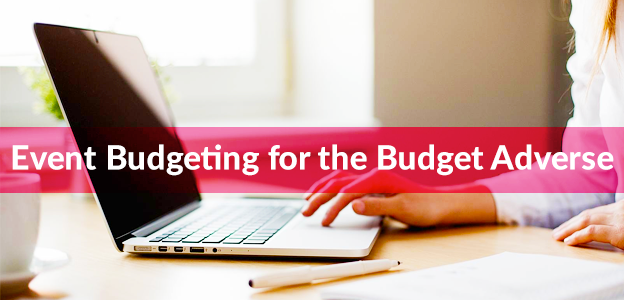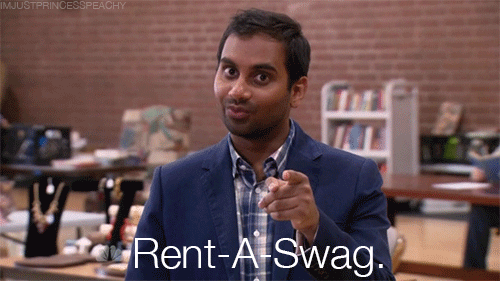
Event Budgeting for the Budget Adverse
Planning an upcoming event is overwhelming and exhausting. There are so many moving parts to keep track of and the worst thing that could happen is that the entire event flops and no one comes and your entire career as you know it collapses in on itself like a black hole.
[caption id="" align="aligncenter" width="500"] That center section? Yeah that would be your career as you know it. (credit: Fox)[/caption]
So.
There is that.
We don’t know astrophysics and we can’t do anything about being crumpled into oblivion by a black hole, but we do know events. So in a way, we’re almost defenders of the galaxy. A galaxy of events. You’re welcome.
As a ticketing company, we also know how the event budget can get overwhelming.
No wait, come back! Don’t leave yet!
I know the B-word is scary, it is to me too, but let’s be honest, we all know we have to deal with budgeting when getting an event off the ground. If we didn’t we’d all probably have $2,000 Swedish floral centerpieces on each table and gold dipped silverware. At least I would. And then we’re back at careers crumbling in on themselves.
So to stop an intergalactic incident, we consulted event planners, event textbooks and some event infographics to put together this handy post to make figuring out your next event budget easier and to keep you from losing your mind and our galaxy not spiralled into a black hole.
First things first. Need a place to be.
[caption id="" align="aligncenter" width="436"]
That center section? Yeah that would be your career as you know it. (credit: Fox)[/caption]
So.
There is that.
We don’t know astrophysics and we can’t do anything about being crumpled into oblivion by a black hole, but we do know events. So in a way, we’re almost defenders of the galaxy. A galaxy of events. You’re welcome.
As a ticketing company, we also know how the event budget can get overwhelming.
No wait, come back! Don’t leave yet!
I know the B-word is scary, it is to me too, but let’s be honest, we all know we have to deal with budgeting when getting an event off the ground. If we didn’t we’d all probably have $2,000 Swedish floral centerpieces on each table and gold dipped silverware. At least I would. And then we’re back at careers crumbling in on themselves.
So to stop an intergalactic incident, we consulted event planners, event textbooks and some event infographics to put together this handy post to make figuring out your next event budget easier and to keep you from losing your mind and our galaxy not spiralled into a black hole.
First things first. Need a place to be.
[caption id="" align="aligncenter" width="436"] Pro tip: Don’t have your event on Jakku. (Credit: Disney)[/caption]
You probably already know what the most important thing for your event is as you’ve been agonizing over it for some time now. If you don’t know what the key part for your event, you’ve got some catching up to do. We’ll give you a moment to think about it.
Good? Okay. For most people, the main part to the event is the where; where is the event going to take place? And the answer will be [insert name of venue location here]. So naturally, the first thing you should have on your budget and the thing you should make sure your money goes towards is venue.
It should be noted that just because something is first or most important doesn’t mean it is the most expensive. To have an event you need a location and venue, but this is does not mean it will be the largest expense on your budget sheet. Event planners suggest that a venue rental should account for 15% of your budget.
Your venue could be a reception hall, a hotel ballroom, a backroom in a hipster bar or outside on some winery’s gorgeous rolling hills. No matter where it is, you’re probably going to have to pay something to be able to use it.
If you already know exactly where you’re going to hold your event, great, skip on down, otherwise we have some more thinking to do. There are three main things you need to think about before you go looking for a place:
Pro tip: Don’t have your event on Jakku. (Credit: Disney)[/caption]
You probably already know what the most important thing for your event is as you’ve been agonizing over it for some time now. If you don’t know what the key part for your event, you’ve got some catching up to do. We’ll give you a moment to think about it.
Good? Okay. For most people, the main part to the event is the where; where is the event going to take place? And the answer will be [insert name of venue location here]. So naturally, the first thing you should have on your budget and the thing you should make sure your money goes towards is venue.
It should be noted that just because something is first or most important doesn’t mean it is the most expensive. To have an event you need a location and venue, but this is does not mean it will be the largest expense on your budget sheet. Event planners suggest that a venue rental should account for 15% of your budget.
Your venue could be a reception hall, a hotel ballroom, a backroom in a hipster bar or outside on some winery’s gorgeous rolling hills. No matter where it is, you’re probably going to have to pay something to be able to use it.
If you already know exactly where you’re going to hold your event, great, skip on down, otherwise we have some more thinking to do. There are three main things you need to think about before you go looking for a place:
- How many people does it need to hold?
- Does it need high tech hook ups?
- Do you need/want liquor sales?
- Parking
- Valet staff
- Wi-fi
- A/V Equipment
- Tables/Seating
- Catering
- Full Bar
 How most of us feel regarding food, lets be honest. (Credit: Buzzfeed)[/caption]
What is an event without a food? Not an event I’m at. I know I’m not the only one who feels this way (admit, you do too), so expect that catering and food should come to around 20% of your budget (though you should plan for more if you are looking to also have liquor sales).
Finding the right food type is its only difficulty, thankfully one we don’t actually have here in Austin (Morning? Breakfast tacos. Any other time? BBQ. Done.) but finding the food and caterer is only part of the expense. Make sure that your budget also leaves room for:
How most of us feel regarding food, lets be honest. (Credit: Buzzfeed)[/caption]
What is an event without a food? Not an event I’m at. I know I’m not the only one who feels this way (admit, you do too), so expect that catering and food should come to around 20% of your budget (though you should plan for more if you are looking to also have liquor sales).
Finding the right food type is its only difficulty, thankfully one we don’t actually have here in Austin (Morning? Breakfast tacos. Any other time? BBQ. Done.) but finding the food and caterer is only part of the expense. Make sure that your budget also leaves room for:
- Food
- Drink
- Warmers
- Servers
- Catering staff
- Liquor license (if needed)
- Bartender (if needed)
 Hit button, get party. (Credit: NBC)[/caption]
Entertainment is going to be a big part of your budget. You’ve got a place to put people and you’ve fed them and given them a nice libation, but you need a reason for them to be there, other than the free food.
For many corporate events this can be a no-brainer. If you’re hosting a symposium on stopping event-related black holes, you’ll likely have a rather knowledgeable speaker or two there to give a lecture (happy to talk, contact my people). Or maybe it is a bit more of relaxed and fun event, with music and a band. Either way the entertainment is going to cost and depending on how specialized you want it, it will end up costing more.
Hit button, get party. (Credit: NBC)[/caption]
Entertainment is going to be a big part of your budget. You’ve got a place to put people and you’ve fed them and given them a nice libation, but you need a reason for them to be there, other than the free food.
For many corporate events this can be a no-brainer. If you’re hosting a symposium on stopping event-related black holes, you’ll likely have a rather knowledgeable speaker or two there to give a lecture (happy to talk, contact my people). Or maybe it is a bit more of relaxed and fun event, with music and a band. Either way the entertainment is going to cost and depending on how specialized you want it, it will end up costing more.
- Band and/or DJ
- Speakers
- Travel cost for entertainment
- Giveaways/favors/prizes
- Trophy’s
- GIF booth
 Rent all the swag you can! (Credit: NBC)[/caption]
Rentals are a necessity, especially if your chosen venue doesn’t have a lot of them on hand already. Hopefully they will at least have a few of these on hand which will cut down on this expense but if they don’t, your rentals can range from the high-tech:
Rent all the swag you can! (Credit: NBC)[/caption]
Rentals are a necessity, especially if your chosen venue doesn’t have a lot of them on hand already. Hopefully they will at least have a few of these on hand which will cut down on this expense but if they don’t, your rentals can range from the high-tech:
- A/V equipment
- Microphones
- Projectors
- Screens
- Lighting
- Tables
- Chairs
- Plates
- Glasses
- Silverware
- Linens
 Perhaps don’t go with this theme. Maybe. (Credit: Disney)[/caption]
Don’t forget, you want the place to look nice! You may have the best DJ and the tastiest catering but the event will look blah with normal house lights and the generic scuffed up tables and Boringly Beige walls. Make sure to add another 10% to decor to spiff the place up with:
Perhaps don’t go with this theme. Maybe. (Credit: Disney)[/caption]
Don’t forget, you want the place to look nice! You may have the best DJ and the tastiest catering but the event will look blah with normal house lights and the generic scuffed up tables and Boringly Beige walls. Make sure to add another 10% to decor to spiff the place up with:
- Banners/signs
- Centerpieces
- Flowers
- Table decor
- Room decor
- Fee’s
- Printing prices
- Insurance
- Event app
- Promotional/Marketing materials
 Entertainment and food will take a good portion of the budget. Everyone loves good tunes and good food and they make or break your event.[/caption]
This breakdown of your budget is a rough estimate. As mentioned previously, every event is going to be slightly different. Some events you may want to splash out more on rentals and electronics and in others you may need more for food or entertainment (or perhaps your venue has a lot of built ins and they save you a lot of money, who knows we can always dream). These are good parameters to start with when it otherwise feels overwhelming to start your budget. No matter how much money you are working with, your average percentages will be very close.
Don’t let your next event budget overwhelm you, keep to this breakdown and you’ll keep everything from spiralling out of control.
]]]]> ]]>
Entertainment and food will take a good portion of the budget. Everyone loves good tunes and good food and they make or break your event.[/caption]
This breakdown of your budget is a rough estimate. As mentioned previously, every event is going to be slightly different. Some events you may want to splash out more on rentals and electronics and in others you may need more for food or entertainment (or perhaps your venue has a lot of built ins and they save you a lot of money, who knows we can always dream). These are good parameters to start with when it otherwise feels overwhelming to start your budget. No matter how much money you are working with, your average percentages will be very close.
Don’t let your next event budget overwhelm you, keep to this breakdown and you’ll keep everything from spiralling out of control.
]]]]> ]]>